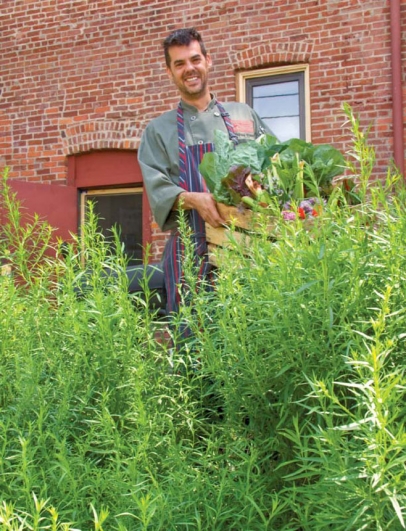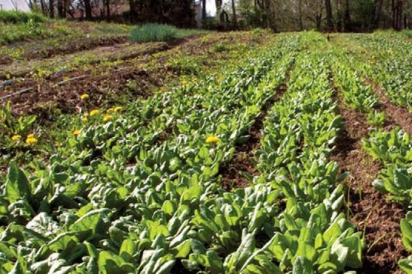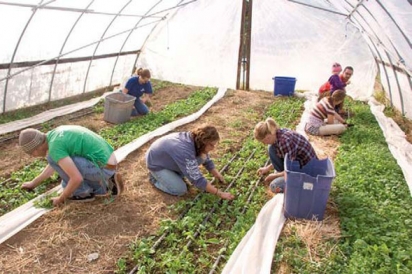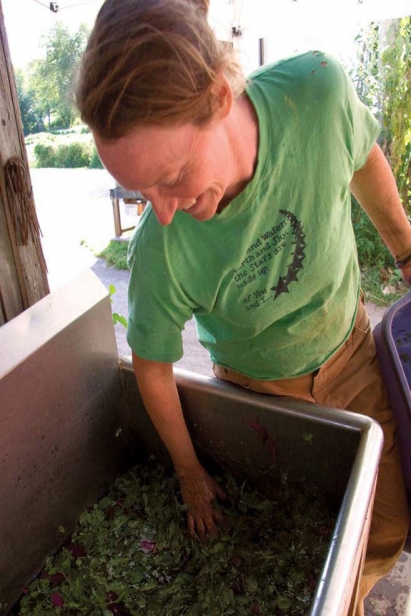Farm to Table: Growing More than Just Good Food
I recently sat down for dinner at The Farmhouse, a farm-to-table, tip-to-tail restaurant in the Kansas City River Market. When my spinach salad arrived, I found myself leafing through it with my fork analyzing each leaf and announced to my friends, “This is from our farm, isn’t it?”
Some at the table questioned how I could possibly know that. “I guess I just know what our spinach looks and feels like – it has thick, ruffled leaves.”
These days, most of us have lost this intimate connection to our food. We don’t know how that spinach arrived on our plate. Michael Foust, chef and owner of The Farmhouse, dropped by our table halfway through dinner. I asked about the spinach; we were right, it was from the Gibbs Road Farm, a two-acre, certified organic vegetable farm in Kansas City, Kan., and home to Cultivate Kansas City.
Since opening his restaurant in July 2009, Foust has become a leader in Kansas City’s farm-to-table restaurant community, helping diners re-connect with where their food comes from through a delicious meal on his ever changing, seasonal menu.
Foust was exposed to the farm-to-table model while working under Chef Nicholas Adams at L’Auberge in Portland. “There were always mushroom guys and fish mongers coming through the back door,” recalled Foust. “Those ingredients were more respected than the stuff that came from Sysco. At that time, I thought a mushroom from the store and a mushroom from the mongers were the same, and then I sat down and tasted them.
I was opened up to whole new world of taste and textures, almost like a whole new pallet of colors – vibrant and full rather than dull and muted.” Since that moment, Foust has never gone back to the dull and muted pallet of industrially produced food.
When Foust was preparing to open his own restaurant, he knew he wanted to be near a market and found the location at Third and Delaware Streets, just a few blocks from the historic City Market. In the first year, he spent a lot of time at farmers markets, shopping, researching, networking and asking questions. He used the Kansas City Food Circle’s growers guide to get in touch with organic local farmers. Today, Foust’s network of farmers has grown. “The community that we belong to has so much knowledge. If a farmer doesn’t have something I’m looking for, they usually know someone who does,” said Foust.
Foust loves walking out from the kitchen and seeing his farmers, ranchers, and people he does business with eating and seeing their food on their plate. He takes pride in being able to put a face to the products he is working with, and even more pride in seeing folks enjoying his work. “You just don’t get the same feeling when you cut open a package from IBP,” stressed Foust.
Alicia Ellingsworth, Farm Manager at Cultivate Kansas City’s Gibbs Road Farm since 2009, remembered connecting with Foust in 2011. “I had heard about Foust and The Farmhouse, and one day we were both leaving an event and I spotted him across the street. I yelled at him, like I do with everyone, and showed him what we have to offer.”
Since then, the relationship between the Gibbs Road Farm and The Farmhouse has developed. “Slowly you get to know people and what they want,” explained Ellingsworth. “We showed off our best looking produce, expressed our commitment quality, and made sure both of our expectations were being met.”
Alan Garrison of Windhaven Farms in Holt, Mo. recalled a similar story, “I have nerves of steel, so I just walked into his restaurant and showed him what I’m doing on my farm raising chickens for meat and eggs, hogs, rabbits, turkeys and a little bit of produce.” For both of these farmers, taking that first step to reach out and build a relationship with Foust has transformed their businesses and changed how food travels from seed to plate in Kansas City.
“Working with restaurants lets me be a real farmer, explained Garrison. “You can’t afford to raise hogs sustainably unless you can sell them to someone like Michael. If you are a monoculture, you can’t do all the things that the land really needs. This model allows you to do all those things – better rotations, better care for the land, better everything.”
Garrison’s farm business was struggling until he connected with Foust. Today, he sells meat, eggs and some produce to seven Kansas City restaurants. In 2010, the Gibbs Road Farm sold less than $1,000 of produce to local restaurants. In 2012, that number grew to $25,000, nearly a quarter of the farm’s profits. In total, Foust estimates that he invested $150,000-$175,000 into the local economy last year.
At the Gibbs Road Farm, production has historically been planned for farmers markets and Community Supported Agriculture (CSA) members, but since working with Foust and four other farm-to-table chefs, thathas shifted. “We know what they want, so we plan accordingly for each chef. Some chefs even have their own beds that we plant, tend and harvest for them,” explained Ellingsworth. “Our micro green production has increased dramatically; the chefs can’t get enough of it!”
Building the relationship is only part of the story of our food.
One of Foust’s favorite items on the menu this Spring was the Windhaven Farm’s chicken breast, stuffed with Skyview Farm and Creamery’s goat milk Linnchego cheese, fried onion grits, garnished with crispy stuffed chicken skin, Apricot vinegar sauce, served with a side salad featuring Gibbs Road Farm’s spinach and arugula. The chef couldn’t recall exactly how he connected with the farmers who supplied the products for this dish, just that they were all part of the network he had built.
The spinach started its journey as seeds that were planted at Gibbs Road Farm in January, nurtured and harvested through cold, rain, wind and snow. “Fresh local greens during the winter are such a treat that we can sell as much as we can grow,” said Ellingsworth. “It makes it worth the challenges of winter production and harvest.”
The planning for the chicken breast started months before the egg even hatched. “First I plant the forage crop, and then move of the hogs through, then the chicken tractor follows,” shared Garrison. “It is a grand swirl and rotation of things. When everything fires right, it is amazing what you can do on a smaller acreage.”
Garrison keeps track of everything in his head, a sign that he deeply understands the rotations and plans on his farm. He has created his systems through research, reading and trial and error. Of course, even the best-laid plans still have to deal with weather. “There is a tremendous amount that goes into this; the work load is unbelievable,” shared Garrison.
Windhaven Farms gets its chicks from Stover Hatchery in Stover, Mo.. Typically, the chicks spend seven to eight weeks on the farm before they are ready for processing and then Garrison takes them to Alma’s Farm Fresh Meats in Alma, Mo. for processing and freezing. This allows Garrison to offer a steadier supply for his restaurant customers. Garrison delivers eggs and meat to The Farmhouse about twice a week, a short, 30-minute drive from his farm.
Ellingsworth and the Gibbs Road Farm crew deliver fresh, seasonal produce on Wednesdays as part of their CSA delivery route. Delivery to restaurants is a highlight of Ellingsworth’s week.
For Gibbs Road Farm, Windhaven Farms and the dozens of local farmers that supply The Farmhouse and Kansas City’s other farm-to-table restaurants, farming is a business, but just as important as the dollars are the relationships along the chain from farmer to customer.
“Part of what makes selling to restaurants so rewarding is the connection when we drop produce off at the back doors. The kitchen staff always smiles, stops to say hi, and thanks us for the produce,” revealed Ellingsworth. “The best is when they oooh and aaah over how beautiful our vegetables are. They respect and value what we’re doing. There is friendship and camaraderie. We want to feed our friends; we want to feed people who appreciate what we are doing.”
At first customers were off put by Foust’s constantly changing menu. But, similar to the partnership building between farmers and chefs, Foust started forming relationships with his customers.
“My customers trust what I do and enjoy the way I cook, so it opens up the door to experience things they may not have tasted before, said Foust. “It’s a trust issue. I’m asking for their hard earned money and they want to enjoy [their meals].” Foust is grateful that “Mother Nature tends to give us things that go together at certain times.”
Chefs are learning to trust the farmer and Mother Nature to deliver a delicious meal to their customers’ plates, even if it is something new and unusual.
“Working with Chef Michael is special because he likes unique items, he is willing to play with new and different things, said Ellingsworth.
“Due to the hot weather, our arugula bolted early making it a bit tough for salad. But, another chef we work with had been sautéing the ‘sturdy arugula’ so we gave some to Michael to try. He loved it, so instead of losing a perfectly good bed of arugula, we have been able to sell it, working together with the chefs in new and innovative ways.”
“It makes me so proud that we have a wonderful relationship with Michael. I consider him my friend, almost like family,” shared Garrison. “I appreciate that his customers value what we are doing; it let’s me farm. It also impacts the guys we work with. A few months ago when I walked into my processor, the guys started shaking my hand. Because of the business we do with The Farmhouse and other Kansas City restaurants, they went from working 10-15 hours a week to working 25-30, sometimes close to 40.“
Foust’s staff truly understands what he is trying to build and is committed to his vision for the farm-to-table restaurant. “That’s why they’re here,” Foust explained. “They know every farmer we work with and have visited a few of the farms to get the whole picture.” Ellingsworth and the crew at the Gibbs Road Farm have also made a commitment to support the restaurants that are supporting them.
“When our crew has money to spend and time off, we go to Michael Foust’s place or Renee Kelly’s Harvest restaurant,” said Ellingsworth.
“We want our money to go back into this system because we believe in it.”
“We are growing another dimension to the food system, something beyond just putting a bite of food in your mouth and chewing it. We are growing community, we are supporting each other,” proclaimed Ellingsworth.
“You have a voice with your food dollars. By spending them locally, you are participating in growing these dimensions and layers. It is up to all of us to participate.”
The next time you dine at The Farmhouse, notice the chalkboards listing the farmers. Ask your server about which farms your meal came from. Talk to Chef Michael Foust about the food system he is helping create. Go and volunteer at the Gibbs Road Farm and help tend the food you might find on your plate.
Who knows, you too might just find yourself scrutinizing a leaf of spinach and recognizing the farm where it was grown. Perhaps you will smile like I do while you munch and think of all the friends you know who are building a healthy, sustainable, local food system in our city.







